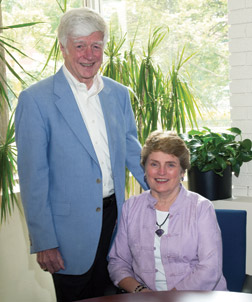Engineering Professor Emeritus J. Thomas Cain and Jacquelyn Cain Pledge $2 Million to Fund Endowed Chair
 J. Thomas and Jacquelyn Cain
J. Thomas and Jacquelyn CainThomas Cain, a professor emeritus in the Swanson School of Engineering, and his wife, Jacquelyn (“Jackie”) Cain, have pledged $2 million to fund an endowed chair in the Swanson School’s Department of Electrical and Computer Engineering. The James Thomas Cain and Jacquelyn Stone Cain Endowed Chair in Electrical and Computer Engineering will allow the Cains, both Pitt alumni, to leave a legacy to Pitt of supporting extraordinary University faculty members.
The benefits of an endowed chair to a department are far-reaching, said Gerald Holder, Pitt’s U.S. Steel Dean of Engineering and also a professor of chemical and petroleum engineering. Endowed faculty chairs help Pitt to attract and retain the nation’s best scholars by enabling the University to offer highly competitive salaries and research support packages, he added.
“We are very grateful for the Cains’ generous commitment. Tom knows that it takes a large amount of resources to compete with elite engineering schools in the U.S., and the number of endowed chairs a school maintains is an important benchmark,” said Holder.
Cain (ENGR ’65, ’67G, ’70G), whose Pitt career spans more than 40 years, can still be found in his Benedum Hall office several times a week as he continues to serve as a graduate student advisor and to participate in research projects. Cain said the most valued aspect of his career was teaching undergraduate and graduate students. He cannot remember a single class that he did not enjoy, he said.
Cain spoke frequently, Jackie Cain (SIS ’75G) recalled, about how much he enjoyed seeing “the bulb light up” for a student—that moment of sudden comprehension.
Cain has won several teaching awards, including the Western Electric Fund Award for Excellence in Engineering Education, and he was named a Fellow for Leadership in and Contributions to Computer Science and Engineering Education by the Institute of Electrical and Electronics Engineers (IEEE), the world’s largest professional association for the advancement of technology. He has served the IEEE in many leadership capacities and was president of the association in 1995. For Cain’s retirement party, former students showed up from across the country to thank and congratulate him—it was an event that touched him deeply.
“The common perception is that the students learn from us,” Cain said, “but it’s really a two-way street.”
The Cains cite a number of reasons for their generous contribution to the University in addition to Professor Cain’s faculty career at Pitt. Their Oakland ties are strong: It is where Jackie Cain was raised and where they both attended high school. It is also the place where they met—at the Carnegie Library. And while Jackie received her undergraduate degree from neighboring Carlow University, both Cains hold Pitt degrees, and they have a mutual, enduring love of Pitt football and basketball.
“The Cains are greatly committed to Pitt,” said Holder. “Tom has been involved with Pitt in just about every imaginable capacity. He and Jackie attend every football and basketball game. Pitt is a huge part of their lives.”
Cain has served on the University Senate Council, and his research has received numerous grants, resulting in the publication of many articles in scholarly journals. He received the Distinguished Alumnus Award from the Department of Electrical Engineering in 1994.
“Tom has represented Pitt very well throughout his career,” said Holder. “Funding this endowed chair is an endorsement of the programs he has long supported.”
One of Cain’s main areas of research is RFID, or Radio-Frequency Identification technology. The University is home to the RFID Center of Excellence, which is among the best-equipped and most highly regarded RFID research centers in the world, occupying six laboratories in Benedum Hall.
Among the most lauded accomplishments of Cain’s exceptional career is his work in establishing accreditation standards for university computer science programs. Beginning with a surge of new university computer science programs in 1982, Cain led an effort that resulted in the creation of the Computing Sciences Accreditation Board (CSAB), which was the first U.S. body to accredit computer science programs. In 1995, CSAB merged with the Accreditation Board for Engineering and Technology, which is now the accrediting body for applied science, computing, engineering, and technology programs.
Cain also played a significant role in establishing an accreditation body in Peru, and he also has made many trips to India, helping to establish its National Board of Accreditation.
Jackie Cain also has been a devoted advocate of Pitt. She has been a longtime volunteer with the University of Pittsburgh Women’s Association, which began in 1912 as a social group for faculty wives. The association is now primarily a scholarship-awarding entity, granting scholarships based on financial need to both male and female Pitt students who have had a break in their education of three or more years.
Other Stories From This Issue
On the Freedom Road

Follow a group of Pitt students on the Returning to the Roots of Civil Rights bus tour, a nine-day, 2,300-mile journey crisscrossing five states.
Day 1: The Awakening
Day 2: Deep Impressions
Day 3: Music, Montgomery, and More
Day 4: Looking Back, Looking Forward
Day 5: Learning to Remember
Day 6: The Mountaintop
Day 7: Slavery and Beyond
Day 8: Lessons to Bring Home
Day 9: Final Lessons

